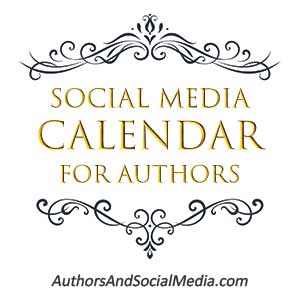Social Media Calendar for Authors: Plan Your Content Strategy
 Creating a social media calendar for authors is an essential step in building a consistent, engaging, and professional online presence. For writers looking to connect with readers, market their books, or grow their personal brand, a well-structured calendar helps ensure regular and relevant posts without the stress of last-minute planning.
Creating a social media calendar for authors is an essential step in building a consistent, engaging, and professional online presence. For writers looking to connect with readers, market their books, or grow their personal brand, a well-structured calendar helps ensure regular and relevant posts without the stress of last-minute planning.
This article about authors and social media provides in-depth tips for creating an effective author social media calendar, detailing why it’s important, how to get started, and tips for success. Written by a former literary agent, it answers common and not-so-common questions about social media for authors, including “Which Social Media Do Authors Prefer?“
Why Do Authors Need a Social Media Calendar?
-
Ensures Consistency
Consistency is key to maintaining audience engagement. A calendar helps you post regularly, which improves visibility and builds trust with your followers.
- Fact: Social media algorithms favor accounts that post consistently, increasing the likelihood of your content appearing in followers’ feeds (Sprout Social, 2023).
-
Saves Time
Planning ahead eliminates the daily scramble to come up with content ideas, freeing up more time for writing and other tasks.
-
Keeps Content Balanced
A calendar allows you to mix different types of posts, balancing promotional content with engaging and value-driven posts.
-
Aligns with Marketing Goals
Authors can coordinate their social media efforts with book launches, events, or seasonal promotions for maximum impact.
-
Reduces Stress
By planning in advance, you minimize the pressure of keeping up with social media while managing your writing career.
How to Create a Social Media Calendar for Authors
-
Define Your Goals
Start by identifying your social media objectives:
- Are you promoting a new book?
- Do you want to engage with readers more effectively?
- Are you building a personal brand or growing your follower count?
Knowing your goals will guide the type and frequency of your posts.
-
Choose Your Platforms
Select the platforms that align with your target audience and goals:
- Instagram and TikTok: Great for visual storytelling and younger audiences.
- Twitter: Ideal for connecting with the writing community and sharing quick updates.
- Facebook: Effective for long-form content, community groups, and live events.
- LinkedIn: Perfect for nonfiction authors or professional networking.
Tip: Focus on 1–3 platforms to avoid burnout and maximize your efforts.
-
Plan Your Content Categories
To keep your feed diverse and engaging, plan posts across different categories:
- Promotional Posts: Announce book launches, share links to purchase, or promote special discounts.
- Engagement Posts: Ask questions, run polls, or encourage followers to share their favorite quotes or characters.
- Educational Content: Offer writing tips, share your favorite resources, or discuss the craft of writing.
- Behind-the-Scenes: Show your writing process, workspace, or research journey.
- Personal Posts: Share anecdotes, inspirations, or milestones to connect on a human level.
- Seasonal or Event-Based Posts: Celebrate holidays, participate in writing challenges like NaNoWriMo, or tie your posts to trending topics.
-
Establish a Posting Schedule
Determine how often you’ll post on each platform based on audience preferences and platform norms:
- Instagram: 3–5 times per week.
- Twitter: 1–3 times per day.
- Facebook: 2–3 times per week.
- TikTok: 2–4 times per week.
Fact: Consistent posting increases engagement by 30%, according to a study by Buffer (2023).
-
Use Scheduling Tools
Social media scheduling tools simplify the process by allowing you to plan, create, and schedule posts in advance. Popular tools include:
- Buffer: Great for managing multiple platforms.
- Hootsuite: Offers advanced analytics and scheduling features.
- Later: Specializes in Instagram scheduling with a visual calendar interface.
- Canva Scheduler: Combines content creation with scheduling.
Example Weekly Social Media Calendar for Authors
While every author’s calendar will differ, here’s an example of how to structure your week:
- Monday: Post a motivational quote related to writing or storytelling.
- Tuesday: Share a behind-the-scenes photo of your writing process or a snippet of your current project.
- Wednesday: Post a writing tip or resource for aspiring authors.
- Thursday: Engage with followers by asking a question, such as “What’s the last book that made you cry?”
- Friday: Promote your book with a call-to-action, such as a purchase link or book trailer.
- Saturday: Participate in trending hashtags, like #SaturdayReads or #AmWriting.
- Sunday: Reflect on your week, share a personal anecdote, or post a teaser for next week’s content.
Best Practices for Maintaining a Social Media Calendar
- Stay Flexible
While planning is essential, be prepared to adapt your calendar for unplanned opportunities, such as trending hashtags or breaking news in the literary world.
- Batch-Create Content
Save time by creating several posts in one session. For instance, design graphics, write captions, and plan hashtags all at once.
- Monitor Analytics
Use platform analytics to track which types of posts perform best. Adjust your calendar to focus on the content that resonates most with your audience.
- Include Visuals
Posts with high-quality images or videos consistently perform better. Use tools like Canva to create professional visuals for your calendar.
- Repurpose Content
Recycle successful posts across platforms or reframe old content with a fresh perspective. For example, a writing tip shared on Twitter can be expanded into an Instagram carousel.
Common Mistakes to Avoid
- Overloading Your Calendar
Posting too frequently can overwhelm your audience and burn you out. Focus on quality over quantity.
- Ignoring Engagement
A calendar ensures consistency but doesn’t replace interaction. Respond to comments and messages to build relationships.
- Being Too Promotional
Avoid making every post about selling your book. Balance promotional content with value-driven and engaging posts.
- Lack of Personal Touch
Readers want to connect with the person behind the books. Share personal insights and anecdotes to humanize your brand.
FAQ - Social Media Calendar for Authors
How far in advance should I plan my calendar?
Plan your calendar at least one month in advance. However, review and adjust weekly to stay relevant and flexible.
Can I use the same content across platforms?
Yes, but tailor the content to fit each platform’s tone and format. For example, a detailed Facebook post can be condensed into a tweet.
Do I need to post every day?
Not necessarily. Focus on consistency rather than frequency. Posting 3–5 times a week on your primary platform is sufficient for most authors.
What if I don't have time to manage social media?
Consider hiring a virtual assistant or social media manager, or use scheduling tools to automate your posts.
How can I strike a balance between social media and my writing?
The key is to set boundaries and create a realistic schedule. Dedicate specific times for writing and social media, and use scheduling tools like Buffer or Hootsuite to batch-create and pre-schedule posts. Even spending just 20 minutes a day engaging with your audience can make a big impact.
How often should authors post on social media?
Consistency is more important than frequency. Aim for a schedule that feels manageable, whether that’s daily, a few times a week, or weekly. For platforms like Twitter, posting multiple times a day works well, while Instagram and Facebook are better suited for 3–5 posts per week. The key is to show up regularly.
Conclusion – Social Media Calendar for Authors
A well-structured social media calendar for authors is a game-changer for building an online presence and engaging with your audience. By planning content in advance, balancing post types, and using analytics to refine your approach, you can create a strategy that supports your goals and resonates with readers. Whether you’re promoting a new book, sharing your writing journey, or connecting with fellow writers, a social media calendar ensures you stay organized, consistent, and impactful. Now that you’ve read “Social Media Calendar for Authors,” click here for the next article in this guide to social media for authors, “Social Media Marketing Services for Authors.”

 This guide about
This guide about 